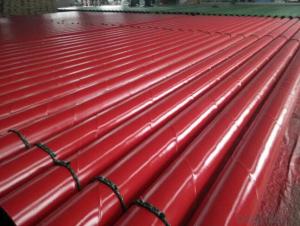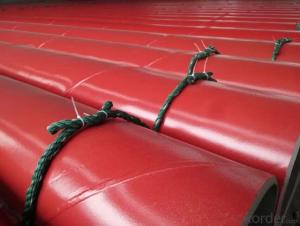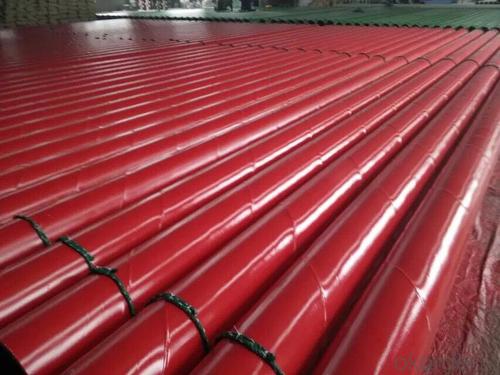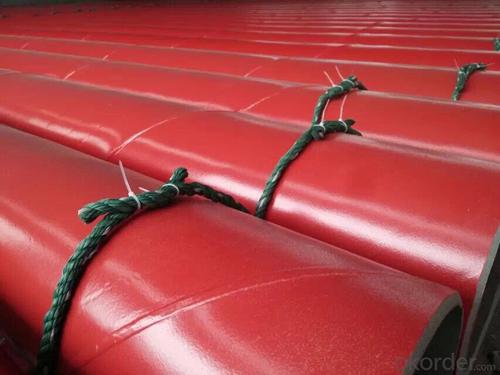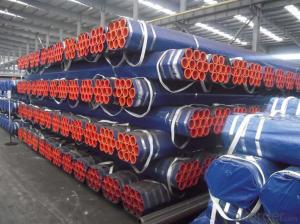SSAW 3 PE steel pipe external coating
- Loading Port:
- China Main Port
- Payment Terms:
- TT OR LC
- Min Order Qty:
- -
- Supply Capability:
- -
OKorder Service Pledge
OKorder Financial Service
You Might Also Like
Specifications
water pipeline inner-layer tape
1 Butyl rubber as adhesive
2. SGS test report and DVGW certificate
3. corrosion protection
water pipeline inner-layer tape
State-of-the-Art Pipeline Protection for All Climates & Environments
System description:
WATER PIPELINE Inner -layer tape also be called pipe wrap anti-corrosion tape, polyethylene wrap tape.
water pipeline Inner-layer tapeT100 is engineered to assure a high bond to the primed pipe surface with excellent conformability characteristics, aggressive adhesive for corrosion protection and repair of main line coatings.
Inner-layer tapeT100 series is cold applied tape coating system for corrosion protection of Oil, Gas, Petrochemical, and Waste Waterburied pipeline, pipe can be buried, also can be underground ,overhead ,onshore and offshore .
Structure of water pipeline inner wrap tape
The specification of the tape consists of two layers, adhesive layer and film backing
Adhesive: butyl rubber
Film backing: Special blend of stabilized polyethylene
Features & Benefits
Provides a permanent bond to the primed steel pipes surface and provides protection against chemical electrolytic corrosion for underground pipelines.
long term corrosion protection
Worldwide reference lists. Established in-ground history
High chemical resistance under service temperature.
Outstanding electric property and permanent adhesion.
Cold applied, No release liner. Makes installation fast and easy.
Complies with EN-DIN 30672 and AWWAC-214 international standards and also ASTM standards.
Be used for water pipeline corrosion protection
System Properties
Type | T138 | T 150 | T165 | T180 | T 250 | T265 | T280 | |
Thickness | 15mil 0.38mm | 20mil 0.508mm | 25mil 0.635mm | 30mil 0.762mm | 20mil 0.508mm | 25mil 0.635mm | 30mil 0.762mm | |
Backing | 9mil 0.229mm | 9mil 0.241mm | 10mil 0.25mm | 10mil 0.25mm | 15mil 0.38mm | 20mil 0.508mm | 25mil 0635mm | |
Adhesive | 6mil 0.152mm | 11mil 0.279mm | 15mil 0.381mm | 20mil 0.508mm | 5mil 0.127mm | 5mil 0.127mm | 5mil 0.127mm | |
When used for ductile iron pipes inner layer 980-20 or 980-25 and outer layer 955-20 or 955-25 are recommended. | ||||||||
Elongation | ³300% | ³400% | ||||||
Tensile Strength | 55 N/cm | 70 N/cm | ||||||
Color | Black | White | ||||||
Peel Adhesion to Primed Pipe | 33 N/cm | |||||||
Dielectric Strength | 30 KV | |||||||
Dielectric Breakdown | 26 KV/mm | |||||||
Cathodic Disbandment | 0.24 in radius 6.4 mm | |||||||
Water Vapor Transmission Rate | < 0.1% | |||||||
Volume Resistivity | 2.5 x 1015 ohm.cm | |||||||
Impact resistance | 5.5Nm | |||||||
Penetration Resistance | <15% | |||||||
Performance | AWWA C-209,ASTM D 1000,EN 12068 | |||||||
Order information
Length | 100ft(30 M),200ft(60 M),400ft(120 M),800ft(240 M) |
Width | 2’’(50mm),4’’(100mm),6’’(150mm),17’(450mm),32’’(800mm) |
- Q: How are steel pipes used in the construction of offshore platforms?
- Steel pipes are extensively used in the construction of offshore platforms due to their durability, strength, and corrosion resistance. These pipes form the structural framework of the platform, providing support and stability. They are utilized for various purposes such as transporting fluids, including oil and gas, and for the installation of risers, which connect the platform to subsea equipment. Additionally, steel pipes are employed in the construction of pipelines and flowlines, facilitating the transportation of hydrocarbons from the platform to onshore facilities.
- Q: How are steel pipes used in the manufacturing of heat exchangers?
- Steel pipes are commonly used in the manufacturing of heat exchangers due to their high strength and durability. They serve as the primary components for carrying hot or cold fluids within the heat exchanger system. The steel pipes facilitate the efficient transfer of heat between the two fluids by offering excellent thermal conductivity. Additionally, the corrosion-resistant properties of steel ensure the longevity and reliability of the heat exchanger, making it suitable for various industrial applications.
- Q: What are the different coatings used on steel pipes?
- There are several different coatings used on steel pipes, including but not limited to, epoxy coatings, fusion bonded epoxy (FBE) coatings, polyethylene coatings, and zinc coatings. These coatings are applied to steel pipes to protect them from corrosion, increase their lifespan, and improve their performance in various environments.
- Q: Can steel pipes be used for both high-pressure and low-pressure systems?
- Yes, steel pipes can be used for both high-pressure and low-pressure systems. Steel pipes are known for their durability and strength, making them suitable for various applications, including both high and low-pressure systems. However, it's important to consider the specific requirements and regulations of the system to ensure the appropriate type and grade of steel pipe is selected for optimal performance and safety.
- Q: What are the safety precautions while working with steel pipes?
- When working with steel pipes, it is important to follow several safety precautions. Firstly, always wear protective gear such as gloves, safety glasses, and steel-toed boots to prevent injuries. Secondly, ensure that the work area is properly ventilated to avoid inhaling harmful fumes or gases. Additionally, use caution when handling heavy pipes to prevent strains or sprains. Lastly, be mindful of potential hazards such as sharp edges, hot surfaces, or falling objects, and take appropriate measures to minimize risks.
- Q: How are steel pipes used in the manufacturing of food processing equipment?
- Steel pipes are commonly used in the manufacturing of food processing equipment due to their durability, strength, and resistance to corrosion. These pipes are used to create a network of channels and conveyors, allowing for the efficient transportation of various food products during the manufacturing process. Additionally, steel pipes are used for the supply of water, steam, and other fluids required for food processing, ensuring a hygienic and safe production environment.
- Q: How are steel pipes repaired if they are damaged?
- Steel pipes can be repaired if they are damaged by various methods such as welding, pipe lining, or using repair clamps. The chosen repair method depends on the extent and type of damage to the pipe.
- Q: Can steel pipes be used for underground chemical pipelines?
- Yes, steel pipes can be used for underground chemical pipelines. Steel pipes are known for their durability, strength, and resistance to corrosion, making them suitable for transporting various chemicals underground. However, it is important to consider the specific type of chemical being transported and consult with experts to ensure that the steel pipes are compatible with the chemical composition to avoid any potential reactions or degradation.
- Q: Are steel pipes resistant to chemicals and corrosion?
- Yes, steel pipes are generally resistant to chemicals and corrosion.
- Q: What are the different types of steel pipe coatings for corrosion protection?
- There are several types of steel pipe coatings used for corrosion protection, including epoxy coatings, polyethylene coatings, zinc coatings, and coal tar coatings. Each coating offers different levels of protection and is chosen based on the specific application and environmental conditions.
Send your message to us
SSAW 3 PE steel pipe external coating
- Loading Port:
- China Main Port
- Payment Terms:
- TT OR LC
- Min Order Qty:
- -
- Supply Capability:
- -
OKorder Service Pledge
OKorder Financial Service
Similar products
Hot products
Hot Searches
Related keywords
